All in a day in Lucerne, Switzerland
Chapel Bridge and Water Tower, Lucerne, Switzerland
When we emerged from Lucerne’s modern train station we looked through the massive arch, a reminder of the former station destroyed by fire.
train station
old arch in front of new railway station
It framed the paddle steamers and historic architecture on the other side of the lake. Replace the motor vehicles with horse-drawn carriages and it was a glimpse of the 19th century when Lucerne was part of the Romantic Age’s Grand Tour of Europe. Queen Victoria visited in 1868 and called it the most charming city she ever visited.
Lucerne, Switzerland
On this side of the lake we were next to the modern KKL, the multifunctional Culture and Convention Center that opened in 1998.
The Culture and Convention Center, KKL
The month-long Lucerne Summer Festival, the largest of three annual events spotlighting some of the best orchestras, conductors, and soloists in the world, was underway.
The Culture and Convention Center, KKL
Lucerne’s magnificent natural surroundings, temperate climate, city amenities, Old World charm, and easy access by road and rail has attracted travelers for over 200 years. It is one of the top tourist resorts in Switzerland.
promenade, Schweizerhofquai, Lucerne, Switzerland
We walked across a bridge lined with flowers to a waterfront promenade shaded by chestnut trees and crossed the street to the 5-star Hotel Schweizerhof Luzern. The Hotel Schweizerhof was built around 1845 and has been owned by the same family for five generations.
view from bridge, Lucerne
lakefront promenade, Lucerne
It was named the Best Historic Hotel in Europe by Historic Hotels Worldwide in November, 2016 and the Best Hotel in Switzerland at the Condé Nast Traveler Reader’s Choice Awards.
Schweizerhof Hotel, Lucerne, Switzerland
The history was evident in every room. Our guest room was named for Mark Twain who wrote about his stay at the hotel in “A Holiday in Lucerne,” part of his book “A Tramp Abroad.”
Mark Twain room, Hotel Schweizerhof, Lucerne
He wrote of a leisurely hike up Mt. Rigi and riding a paddle steamer to the chapel where legendary hero William Tell is said to have escaped from Bailiff Gessler. Twain’s book and an 1885 bottle of Rigi kirsch were under glass on the desk.
Mark Twain memorabilia, Schweizerhof Hotel, Lucerne
We flipped through a book called, “Where History Comes Alive” that had stories of each of the notable guests for whom one of the 110 rooms is dedicated. The list included royalty, celebrities, politicians, industrialists, musicians and more.
“Where History Comes Alive” book in our guest room at the Hotel Schweizerhof, Lucerne
Doors had knobs and sensors in the shape of musical notes in tribute to Richard Wagner, who completed his opera “Tristan and Isolde” during his stay and also and met here with his patron, Ludwig II of Bavaria.
guest room door, Hotel Schweizerhof, Lucerne, Switzerland
musical note doorknobs, Hotel Schweizerhof, Lucerne
Leo Tolstoy and Hans Christian Anderson also found inspiration here. Neil Armstrong chose this hotel while in Lucerne for the opening of the Aviation and Space Travel Hall in the Swiss Museum of Transport, Switzerland’s most popular museum.
The palatial hotel has an elegant bar and function rooms, like the breakfast room.
bar, Hotel Schweizerhof, Glacier Garden, Lucerne, Switzerland
breakfast room, Hotel Schweizerhof, Lucerne, Switzerland
Hotel Schweizerhof, Lucerne, Switzerland
We headed out to see the city, strolling past elegant displays of designer fashions and fine antiques. The twin Gothic towers of the 17th century Hofkirche came into view.
Hofkirche, Church of St. Leodegar, Lucerne, Switzerland
We passed the Old Swiss House Restaurant where August Busch, Jr. met the owner’s daughter, Trudy Bulhozer, in 1951. After their marriage he had an exact copy built at Busch Gardens in Tampa so she would feel at home. If you visit the restaurant, be sure to note the original oil paintings and photographs of famous guests. The stained glass windows have with the heraldic panes of the hand made crests of the cantons of Switzerland, dated 1575, and the porcelain tiled stove from 1636 was initialed by the famous Swiss stove maker Daniel Pfau. Budweiser beer is always available at the Old Swiss House.
Old Swiss Restaurant, Lucerne, Switzerland
We followed the crowds to the Lion of Lucerne Monument, one of Lucerne’s most photographed attractions. Mark Twain called it the most mournful and moving piece of stone in the world.
Lion Monument, Lucerne, Switzerland
It is dedicated to over 700 mercenaries, many from Lucerne, who were slain defending Louis XIV and Marie Antoinette during French Revolution. The monument is in the Glacier Garden, which is the site of Ice Age potholes, a mirror maze and a museum of geology and history.
Glacier Garden, Lucerne, Switzerland
We walked along the main shopping street, Hertensteinstrasse, to the Old Town’s charming pedestrian-only lanes, squares, and fountains.
Hertensteinstrasse, Lucerne, Switzerland
Many of the medieval, Renaissance, and Baroque houses have painted facades depicting area history and culture.
painted facades, Lucerne, Switzerland
The modern town hall is across the river, but from the 14th to 19th centuries, grain was stored and sold in the beautiful ground floor of the Old Town’s Italianate-style Town Hall. Centuries ago, a bell was rung when fire was spotted from its watch tower and people ran to line up with buckets. Town clerks officiate at marriages in Switzerland and this site is now so popular for summer weddings that there is a three year waiting list.
Old Town Hall, Lucerne, Switzerland
Blue and white striped shutters indicate an historic municipal building, like the mint.
The Old Town Mint, Lucerne, Switzerland
The Fritschi Fountain features leading figures in Fastnacht, the lively outdoor celebration before Lent. The legendary Brother Fritschi was a farmer who left money for the Safran guild to serve wine to the poor on Fasnacht. He is said to have been buried here by St. Peter’s Chapel when it was a medieval graveyard.
Fritschi Fountain and St. Peter’s Chapel, Lucerne
Fastnacht begins with a bang called Urknall on “Dirty Thursday” when a guild member and his wife, representing Fritschi, arrive at the Hotel Schweizerhof dock. It continues to the fountain with music, newspaper confetti and orange throwing. There’s a big party at night at the Hotel Schweizerhof, which is also known as the Festival Hotel. It also serves as host for events like the Blue Balls Festival, the Lucerne Blues Festival, the Zaubersee-Russian Music Lucerne and the World Band Festival.
Tourists on the Chapel Bridge were snapping photos of the 17th century houses that line the Reuss River.
Many were built as family homes for Swiss mercenaries who had served in Italy and wanted a Florence style palazzo. Investment groups have divided some these houses into high-end apartments and this is a popular restaurant area for its riverfront dining.
houses along river, Lucerne,Switzerland
Chapel Bridge is an iconic symbol of Lucerne that was originally built in 1333 A.D. at an angle to connect the left and right banks of the Reuss River as part of the city fortification. Louis XIV gave swans to the city in appreciation for the Swiss guards and their descendants continue to glide by.
Chapel Bridge and Water Tower, Lucerne, Switzerland
In the 15th and 16th century Chapel Bridge was the best place for rope makers to work during inclement weather. By the 19th century tourism was in full swing and it was just the place for English ladies to show off their finery.
Of the 110 paintings in the rafters with rhyming captions about local and national history, twenty-five are original, restored after the 1993 fire that destroyed the original bridge.
paintings in Chapel Bridge, Lucerne, Switzerland
paintings in Chapel Bridge
paintings in Chapel Bridge
paintings in Chapel Bridge
paintings in Chapel Bridge
The river’s Nadelwehr, “needle weir,” is an expandable dam that was designed to protect the 19th century mills built on what was then Lucerne’s outskirts in case of fire. It is now prevents flooding of lakeside villages, and is especially busy when the snow melts.
needle weir, Lucerne, Switzerland
The weir is by the Spreuer Bridge, built in 1407 and now the oldest bridge. It offers the best view of the city’s 14th century ramparts and watchtowers. Three of the watch towers are open to the public for free.
needle weir, Lucerne, Switzerland
The Jesuit Church is on the left bank. It was built between 1666 and 1677 and is the first large Swiss Baroque church in Switzerland.
view of bridge and ramparts, Lucerne
Jesuit Church, Lucerne
Protestants wanted to abolish the mercenary contracts that provided revenue to the city. In 1577, as part of the Catholic Counter-Reformation, city council invited the Jesuits, good preachers and teachers of traditional Catholicism, to found a college and attract followers.
Mayor Lux Ritter, from a family of mercenaries, sold his Italian Renaissance-style Ritter Palace to the city for the Jesuit college.
Ritter Palace, later a Jesuit college and now a building for the canton.
The Jesuits were later expelled for political reasons and it is now a cantonal government building. The Swiss government banned mercenaries in the 19th century. Today Swiss guards are only at the Vatican.

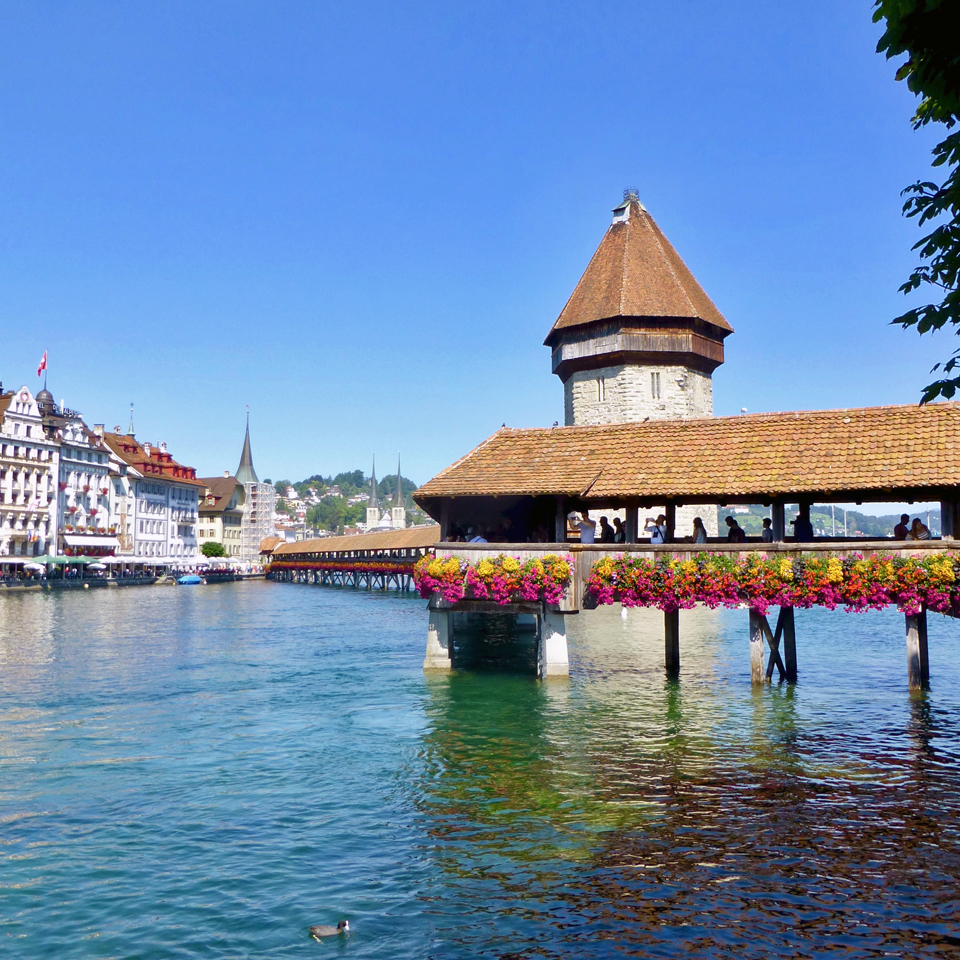
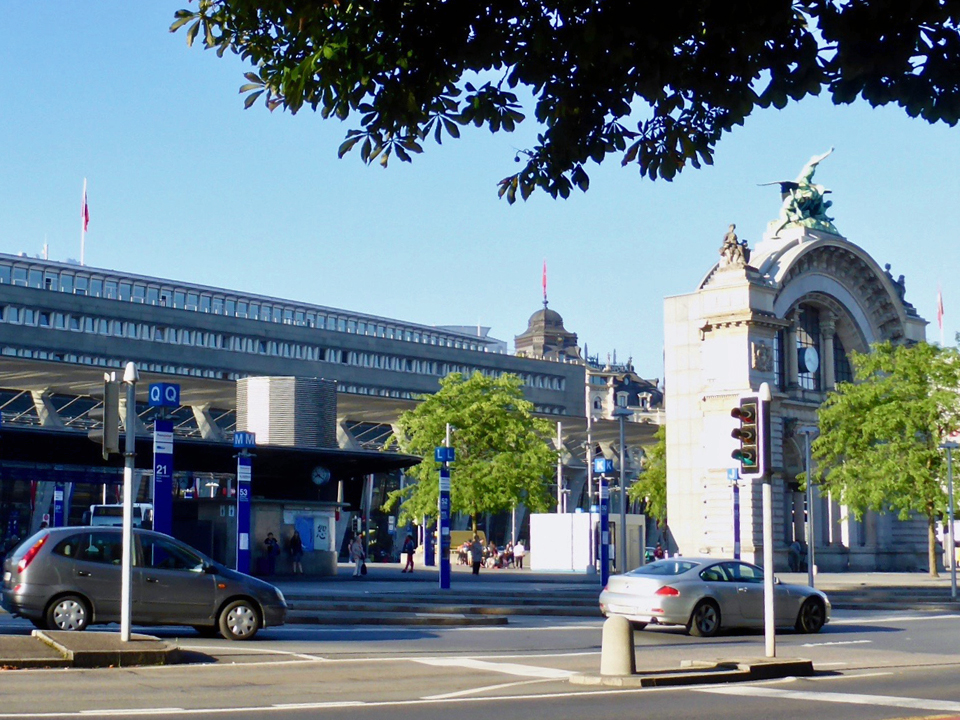
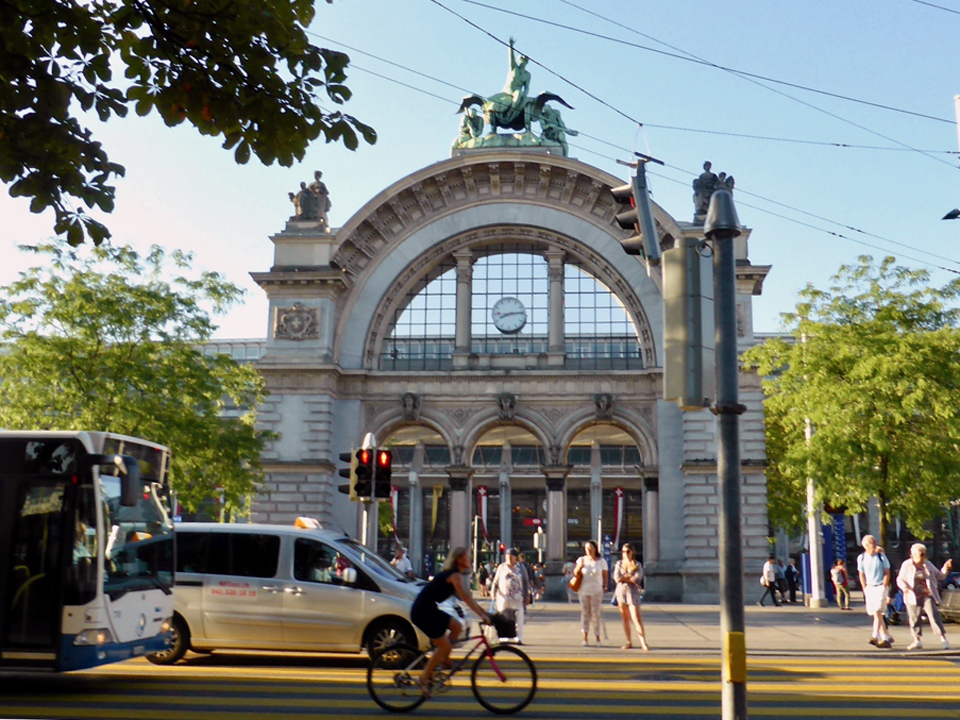
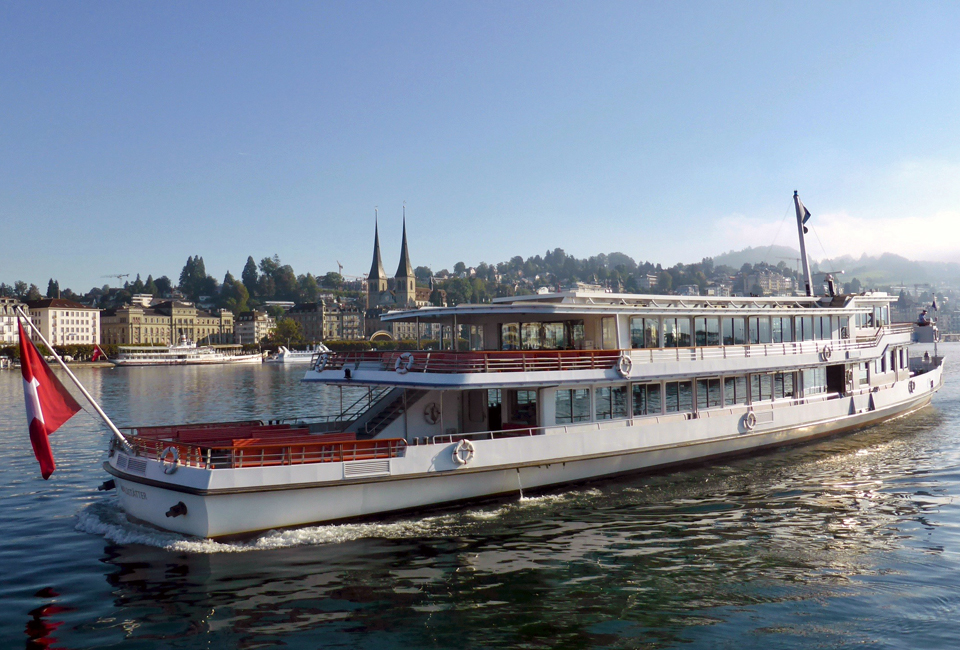
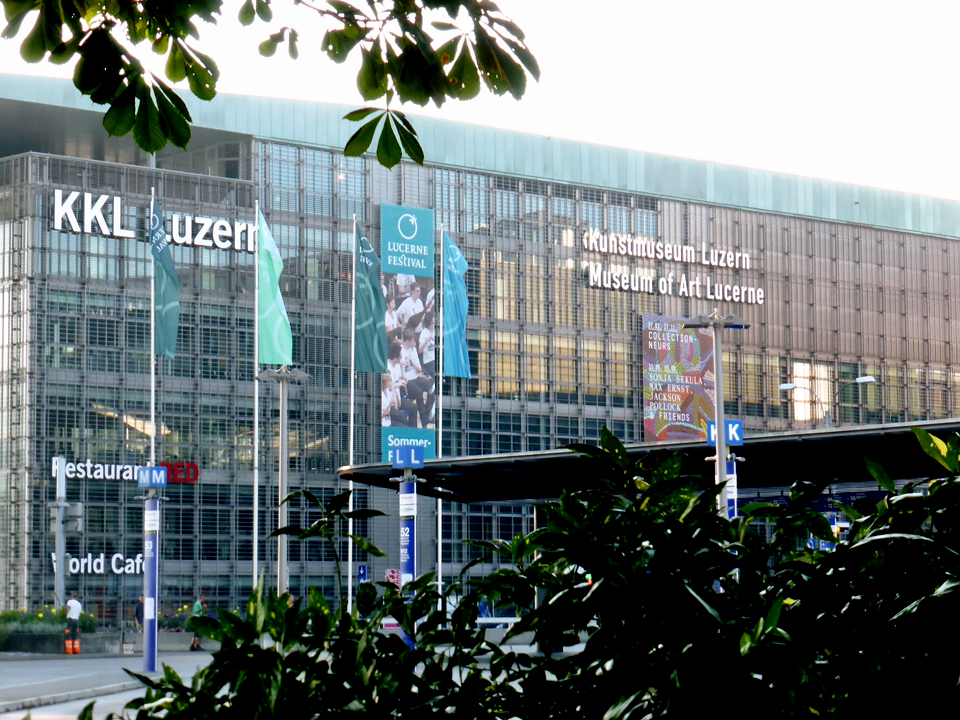
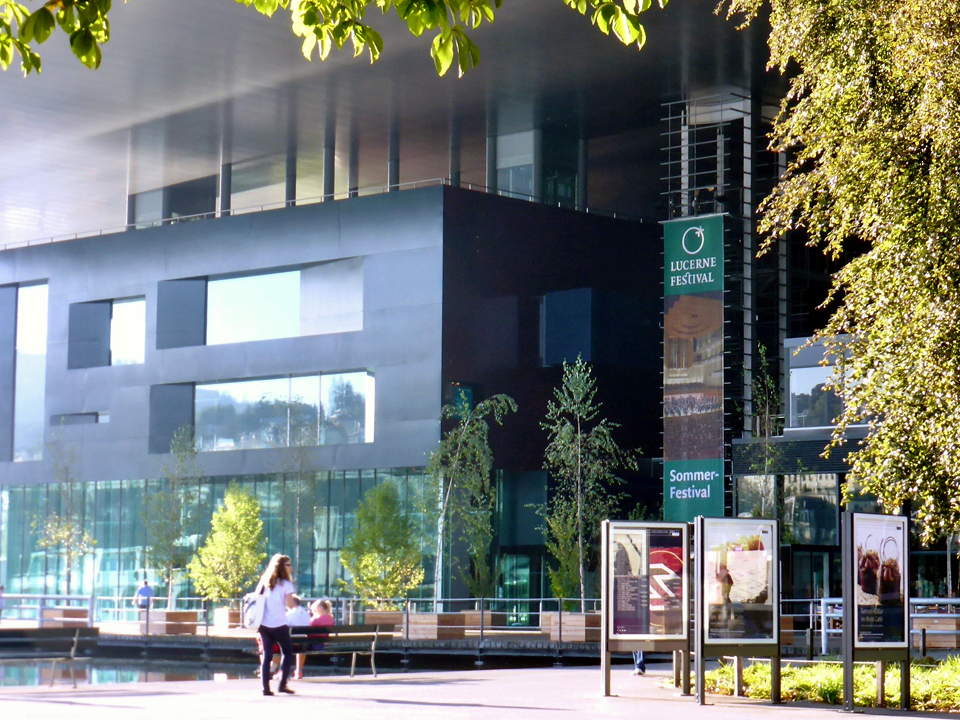
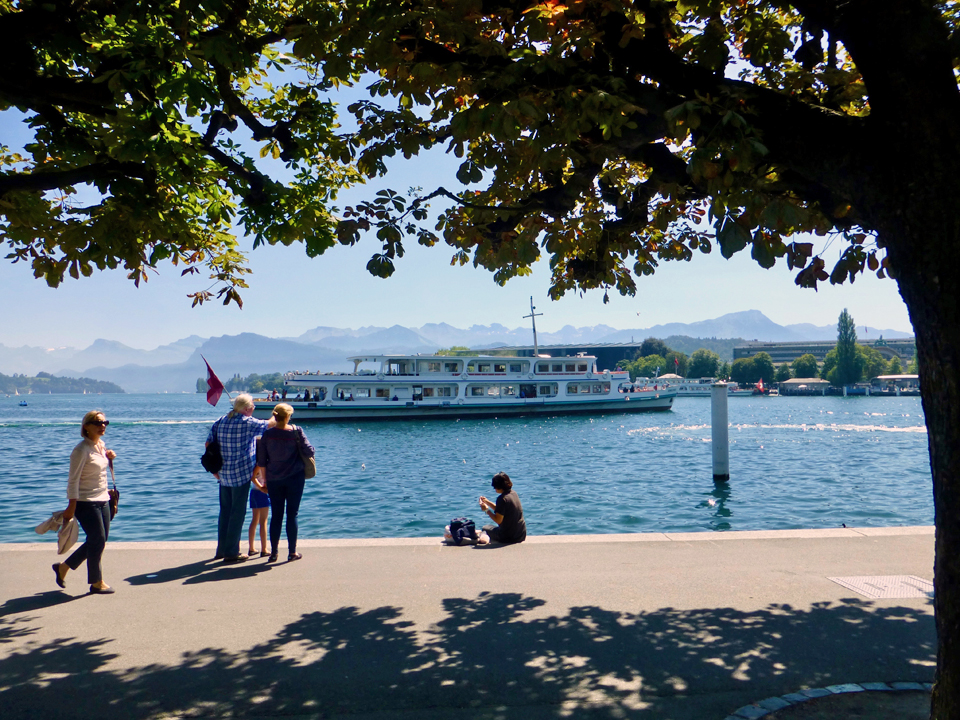
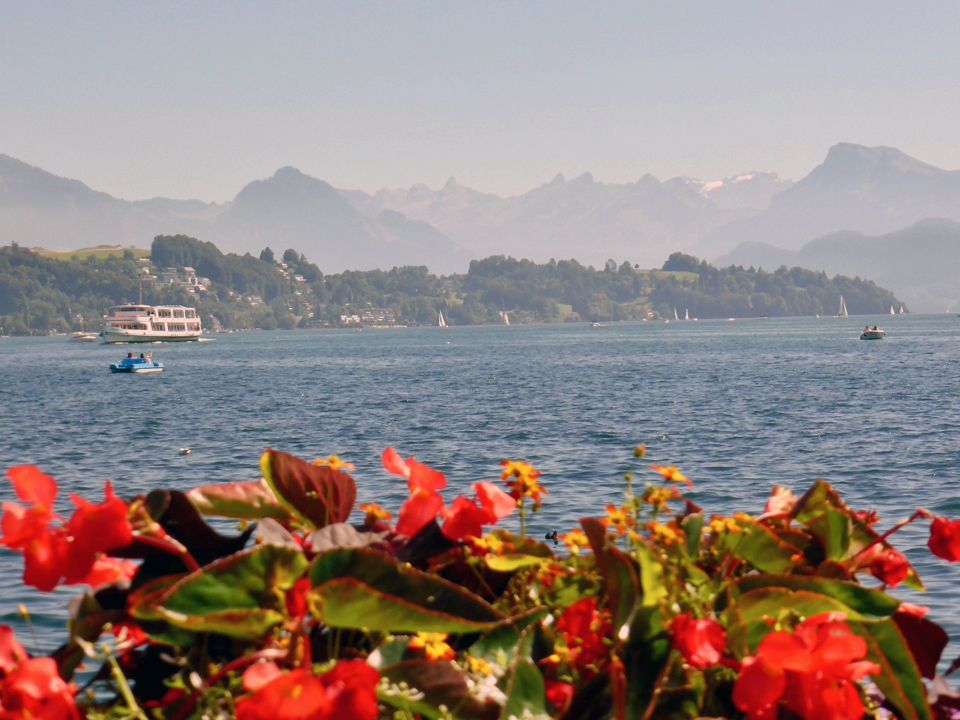
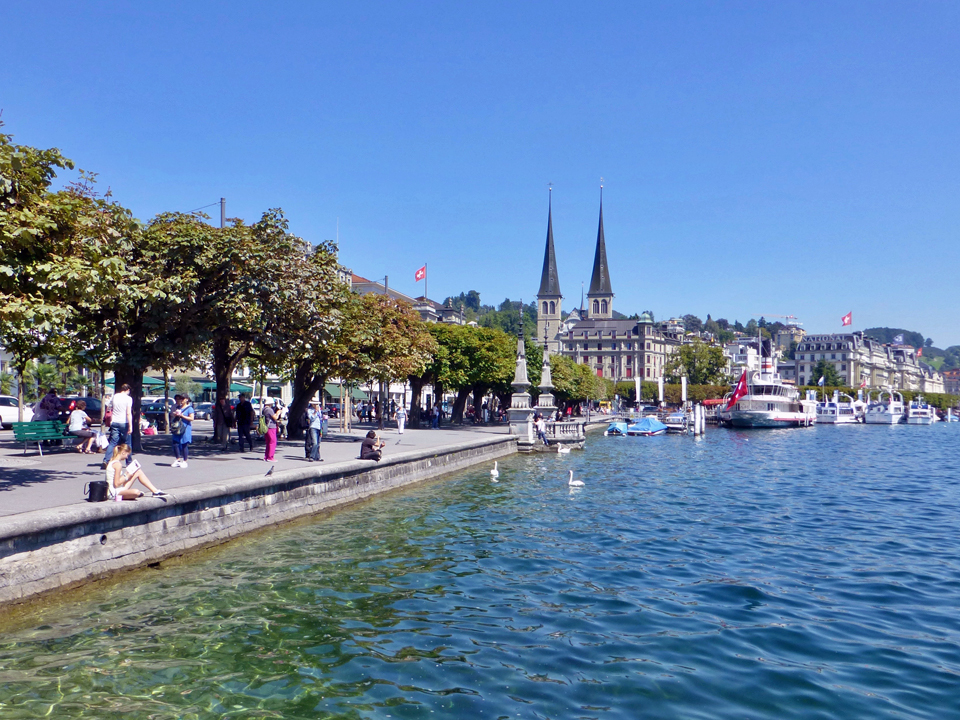
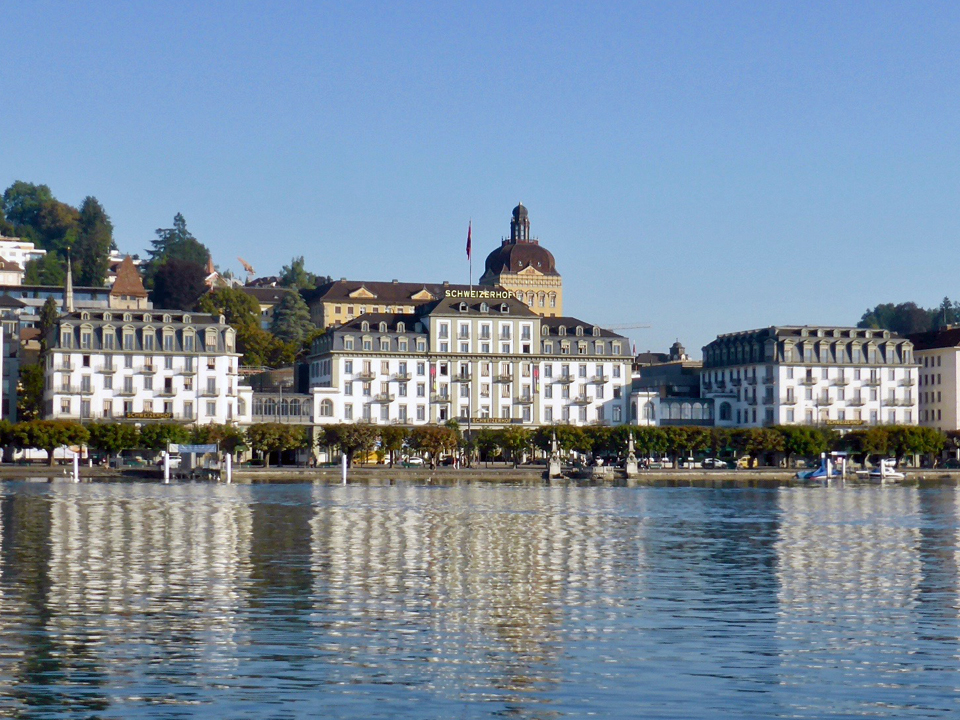
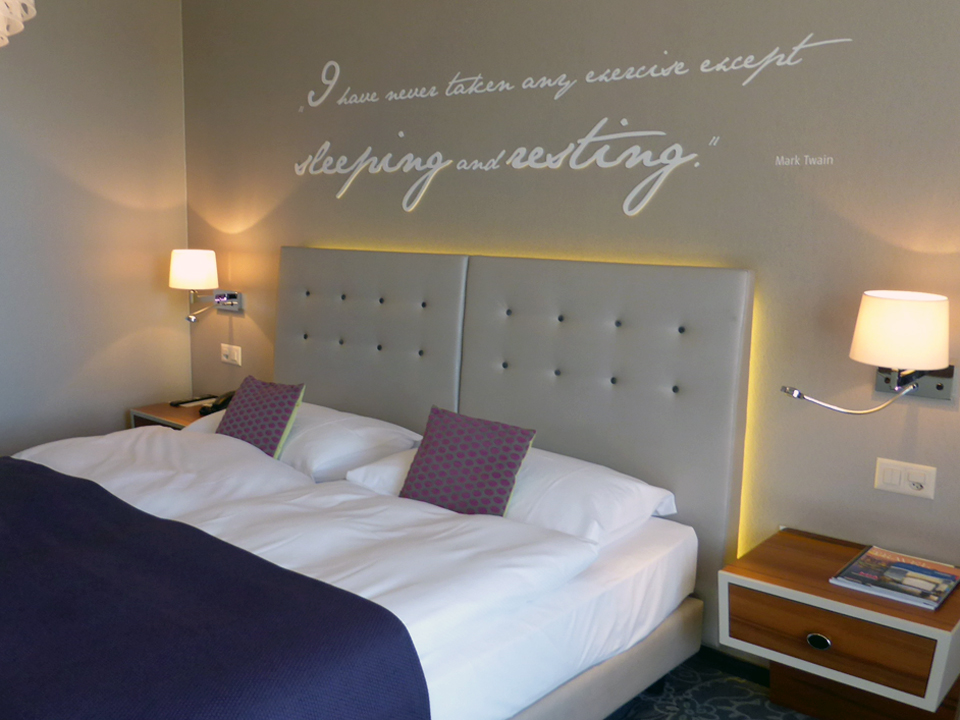
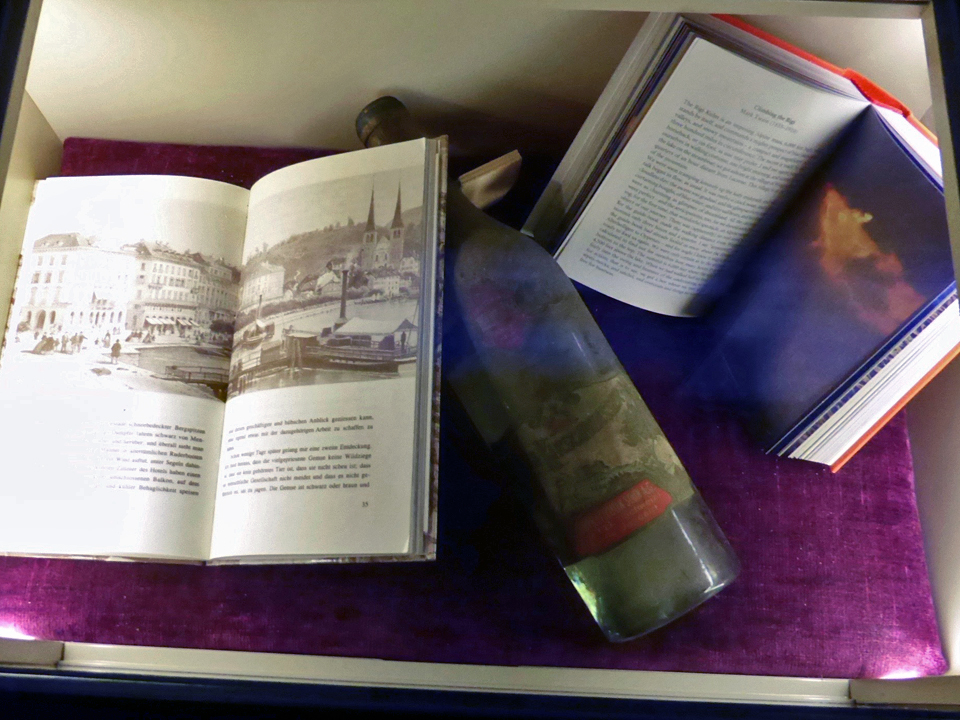
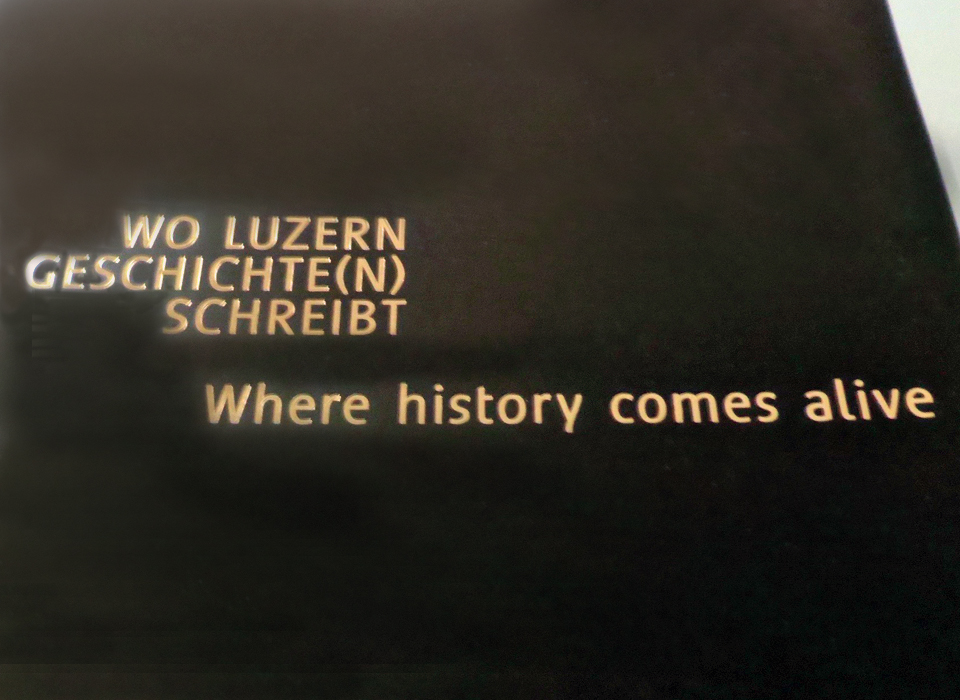
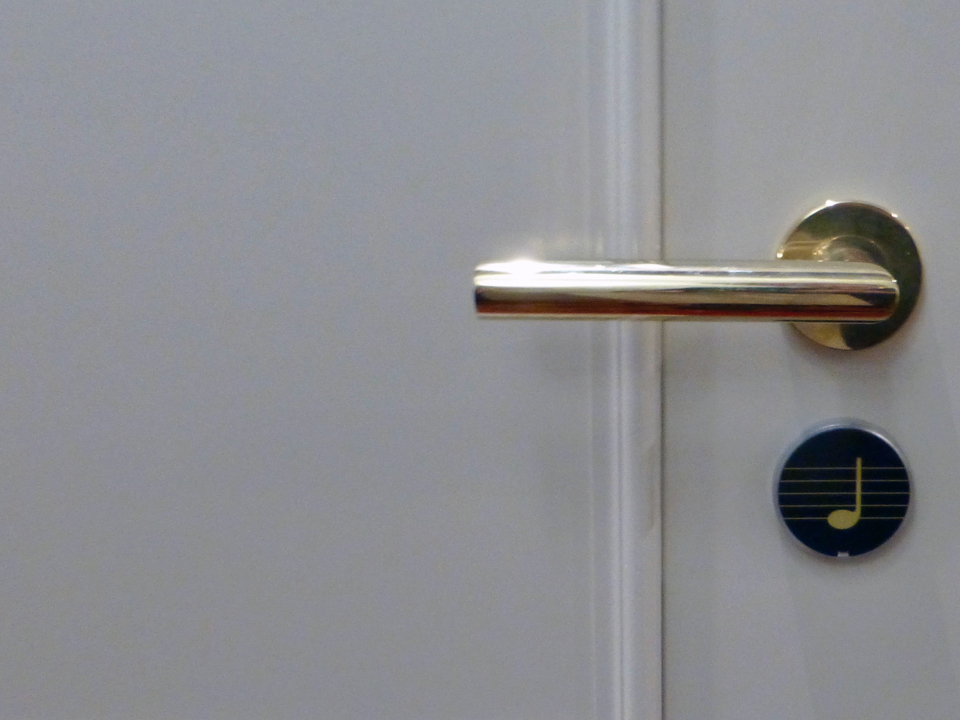
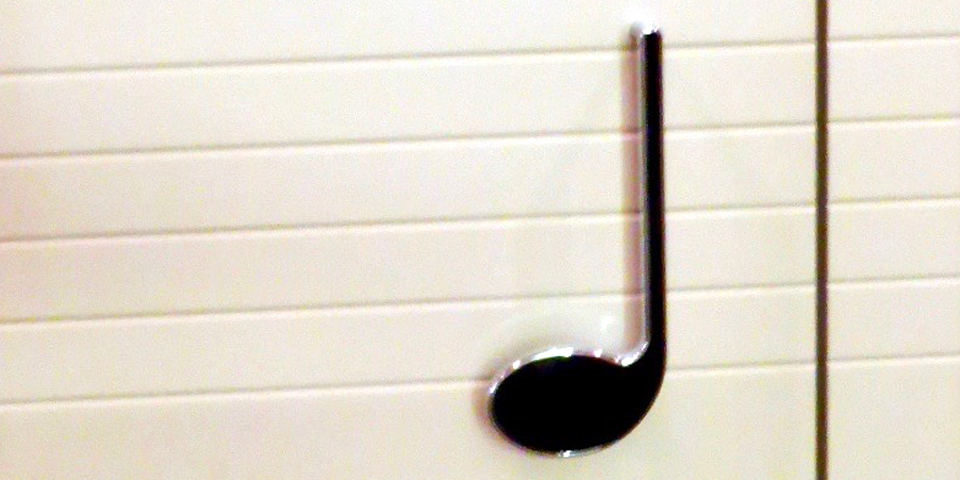
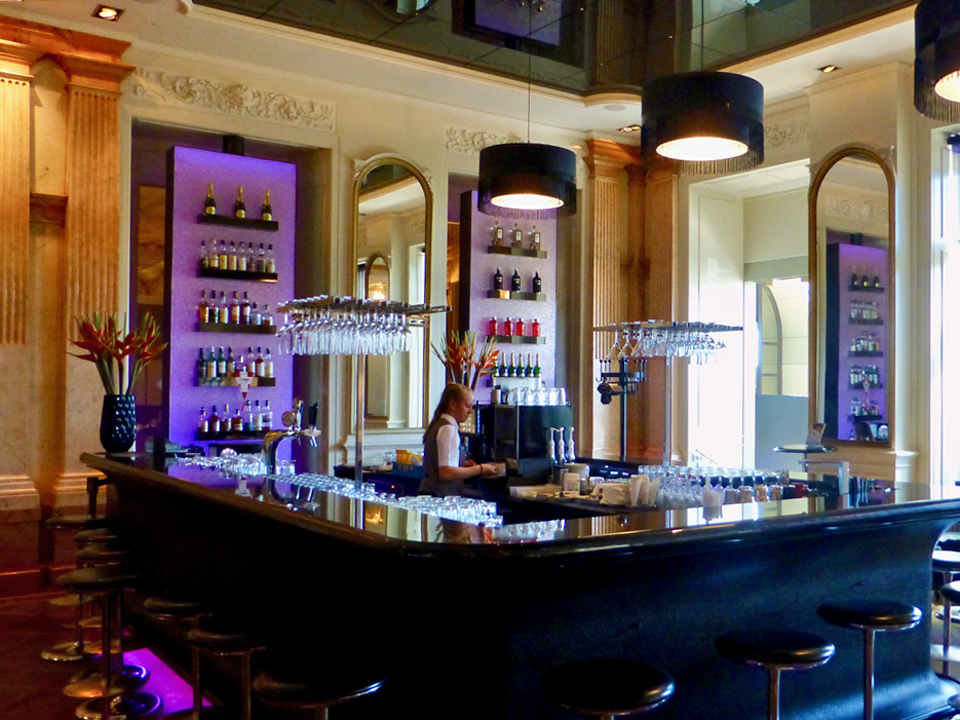
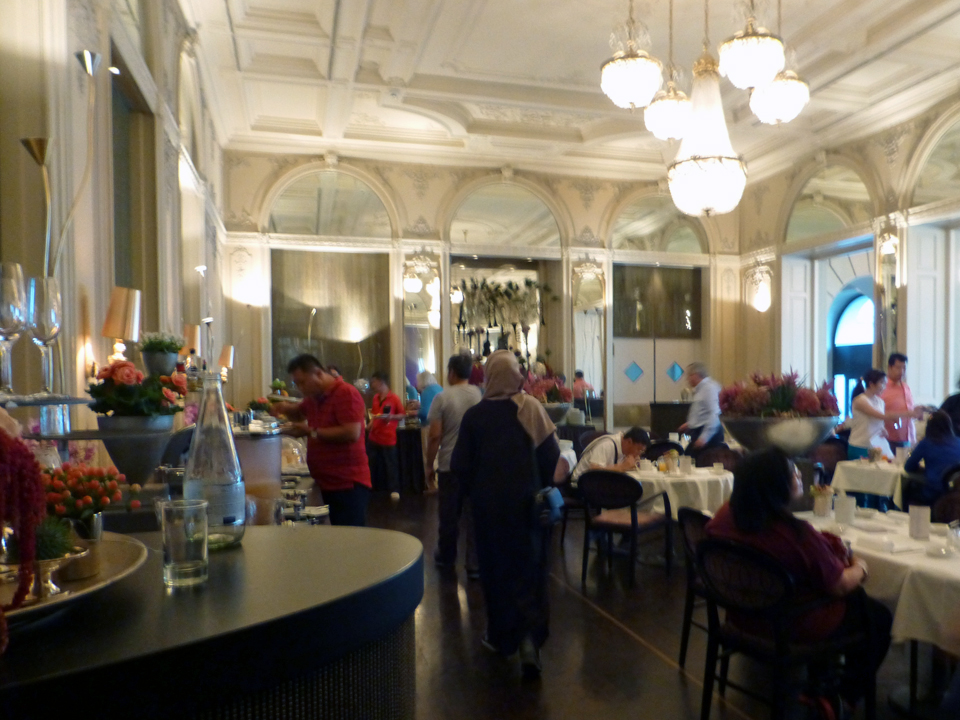
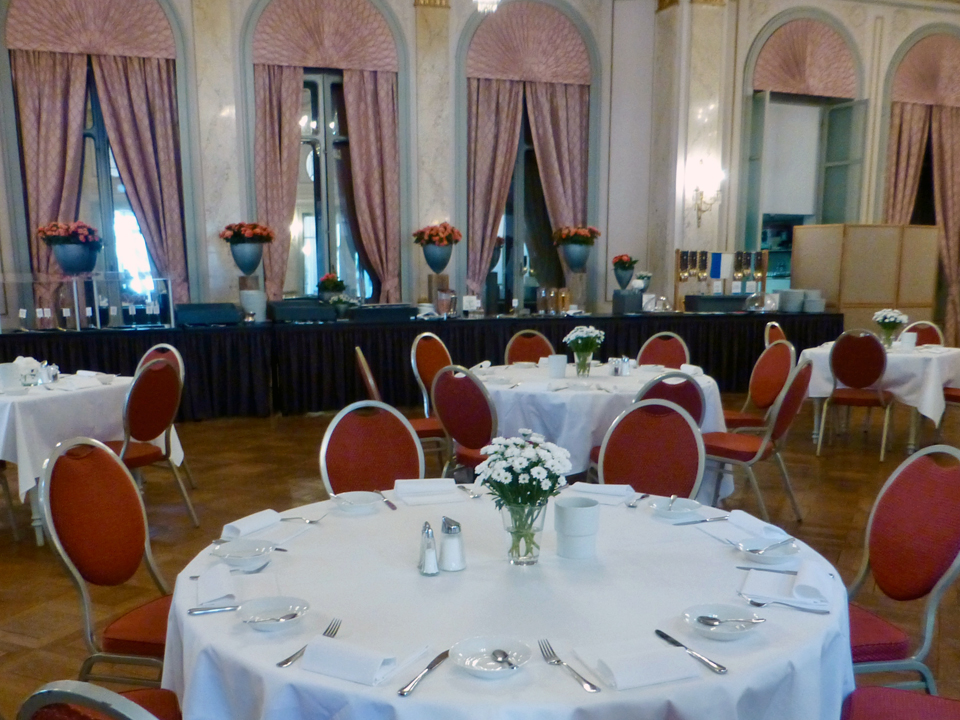
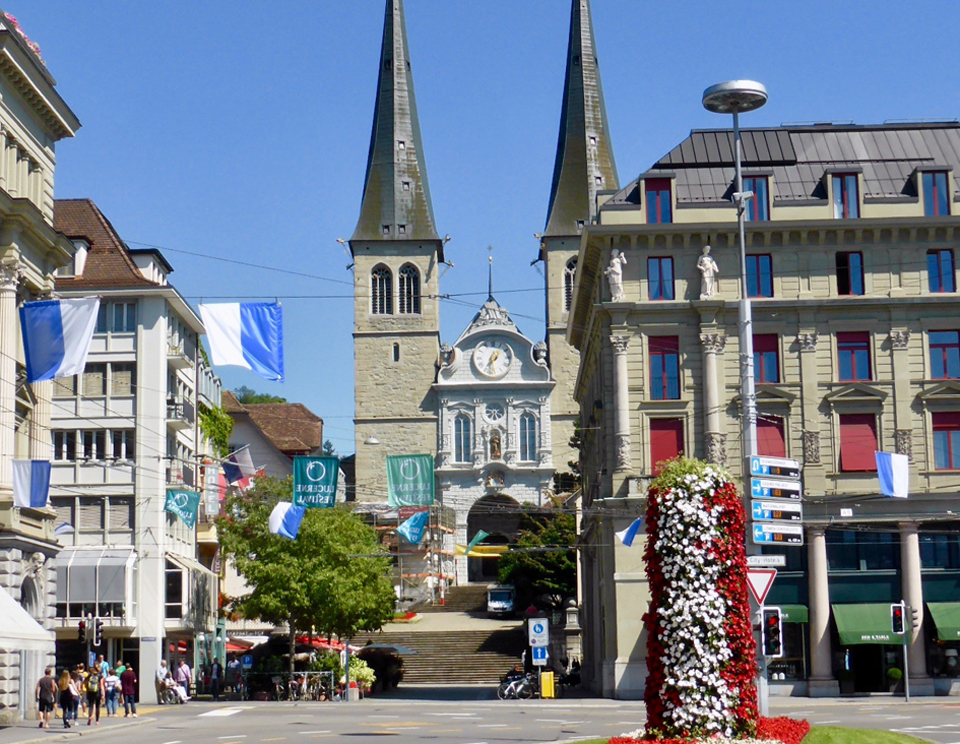
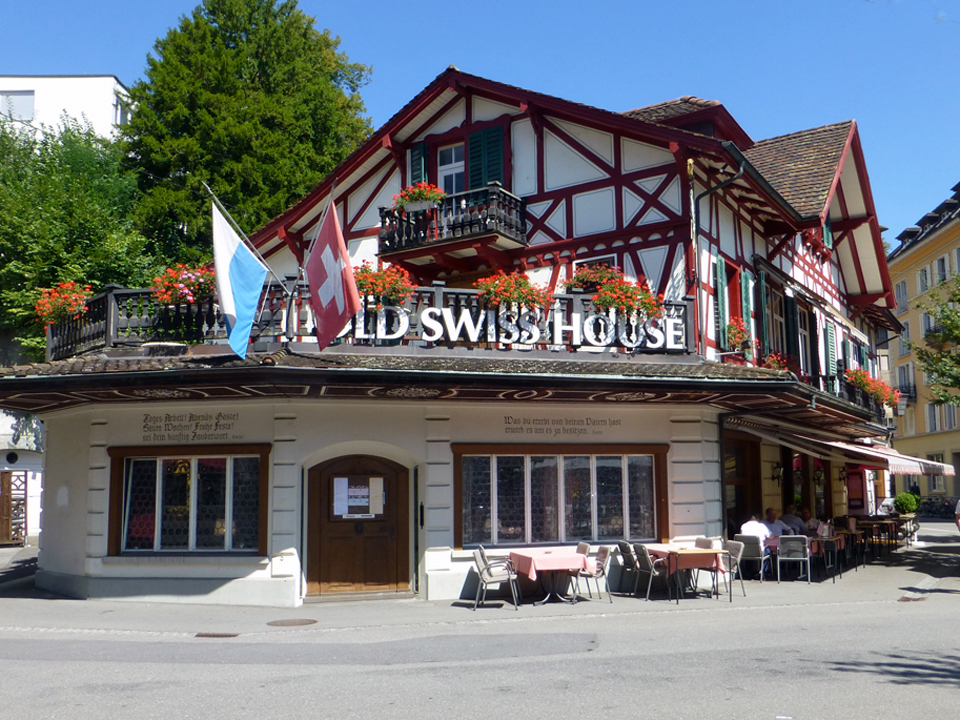
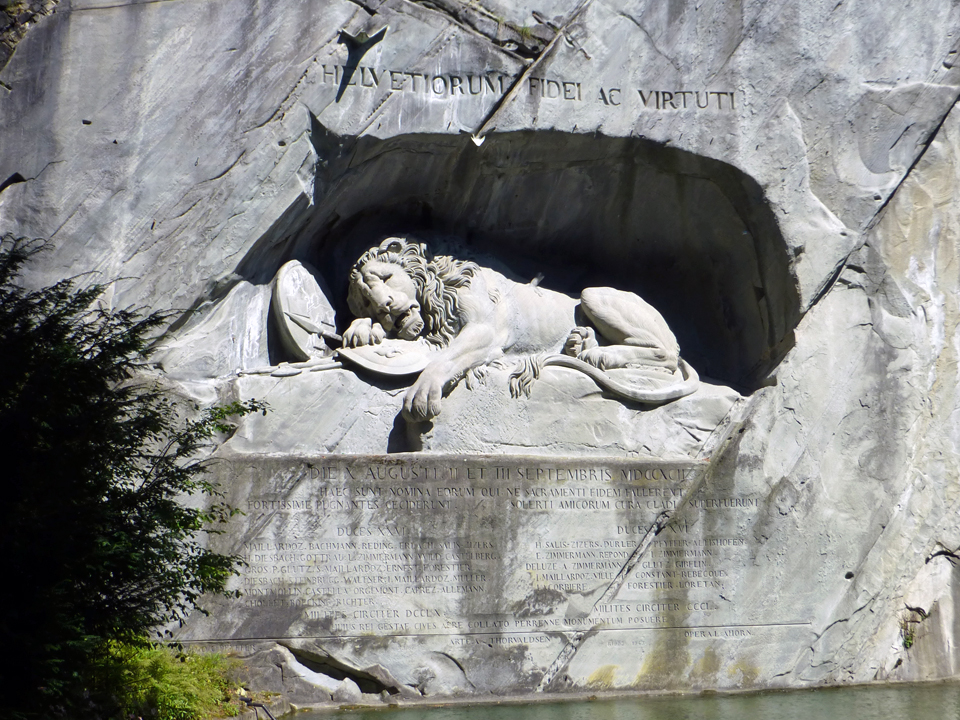
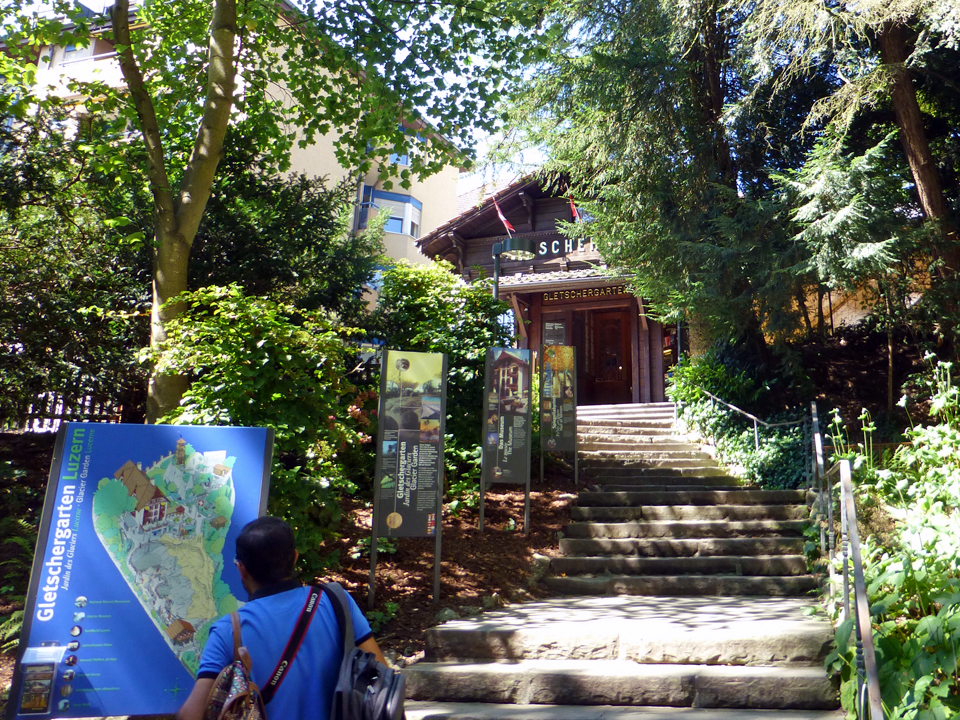
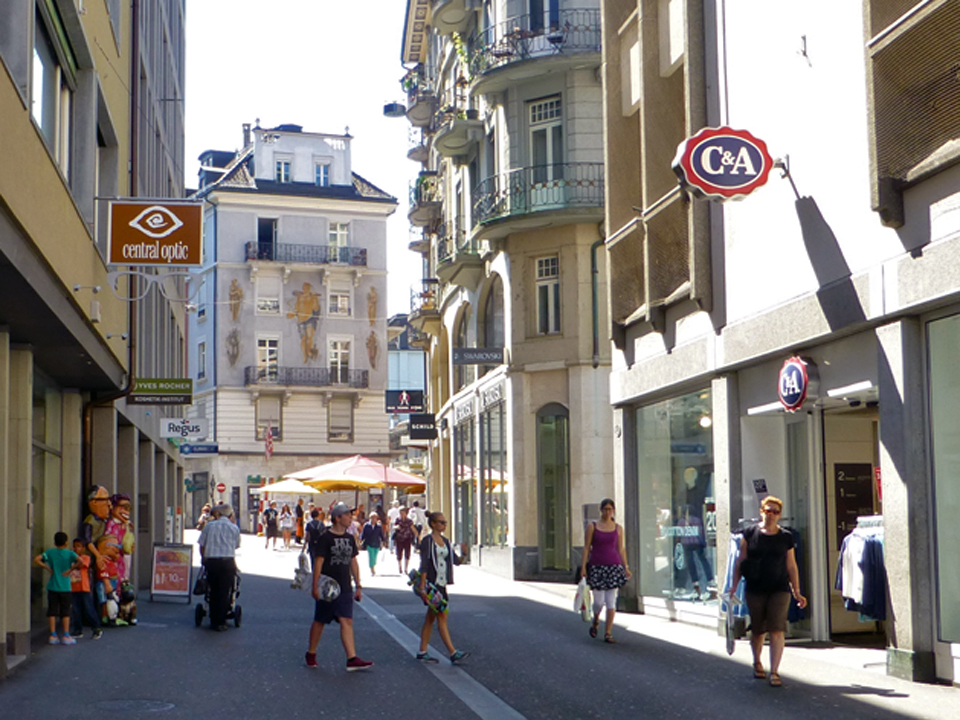
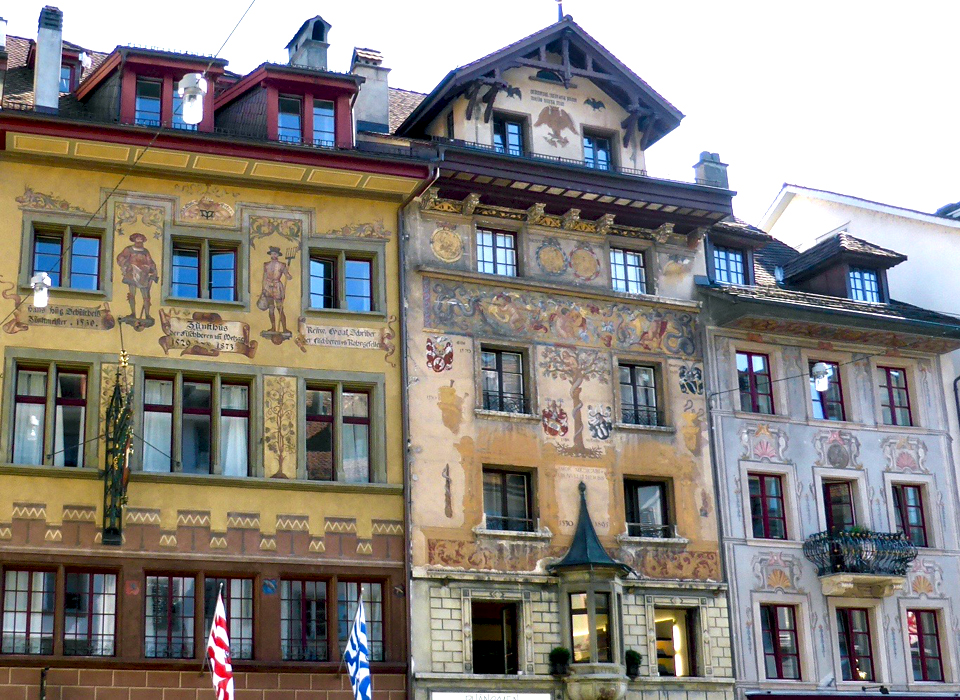
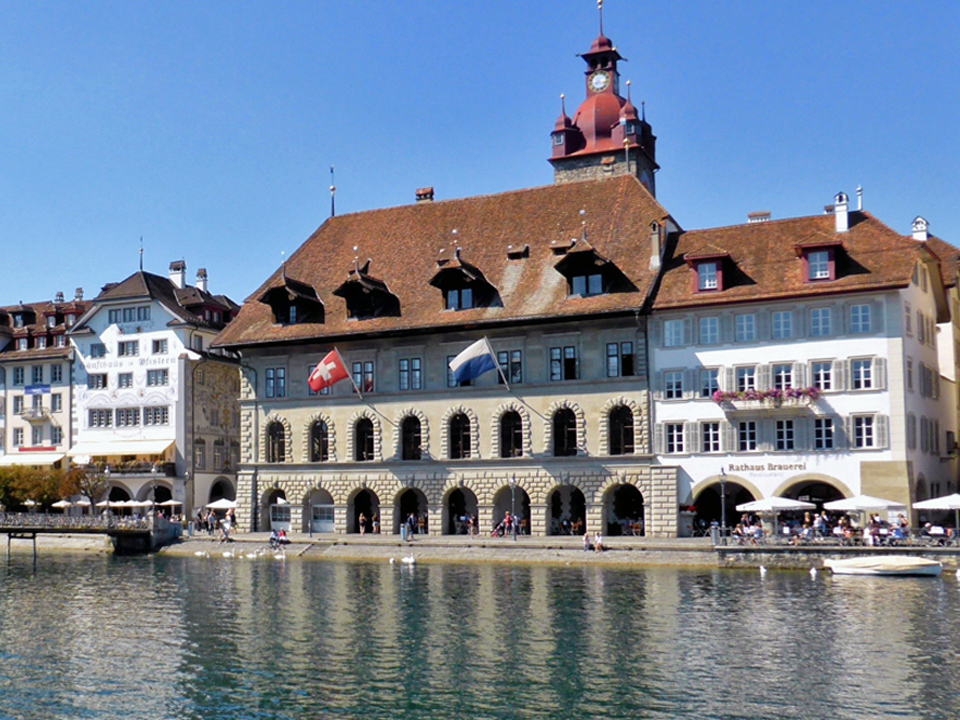
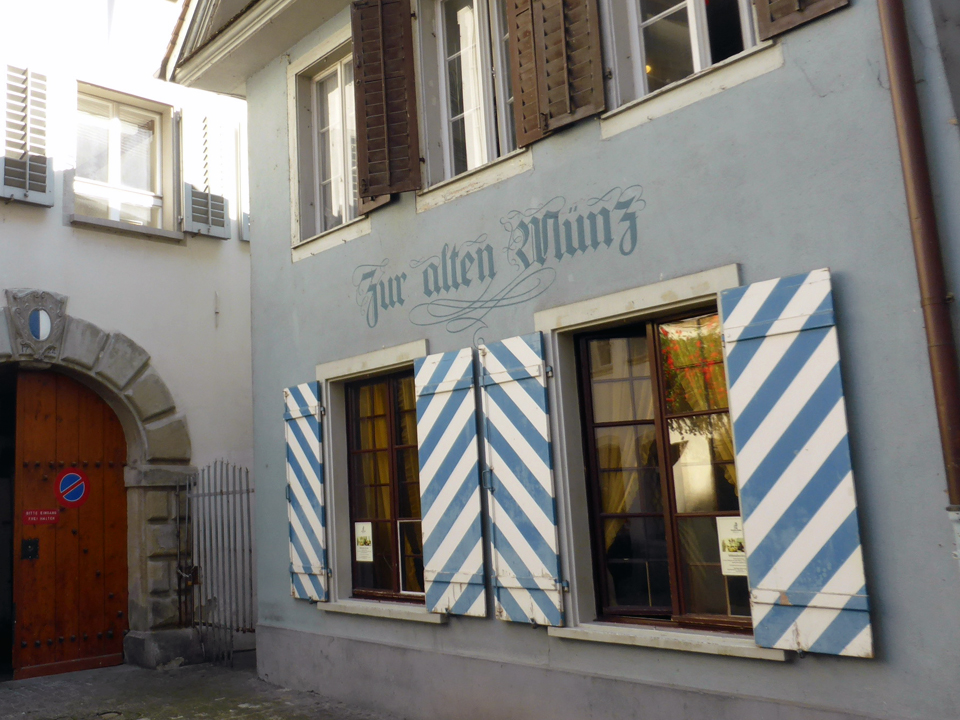
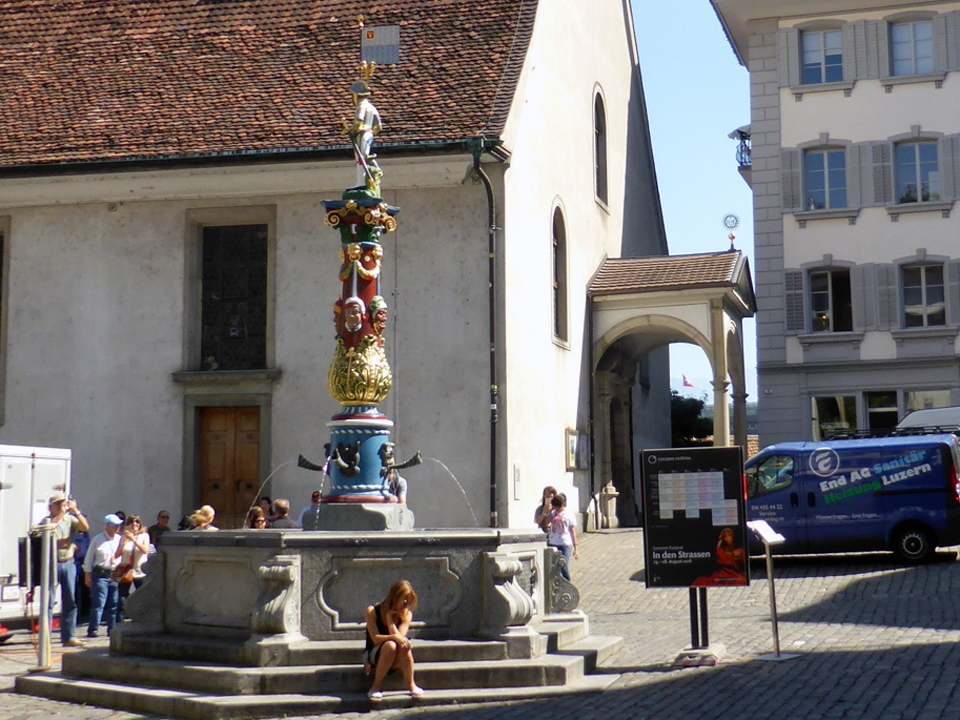
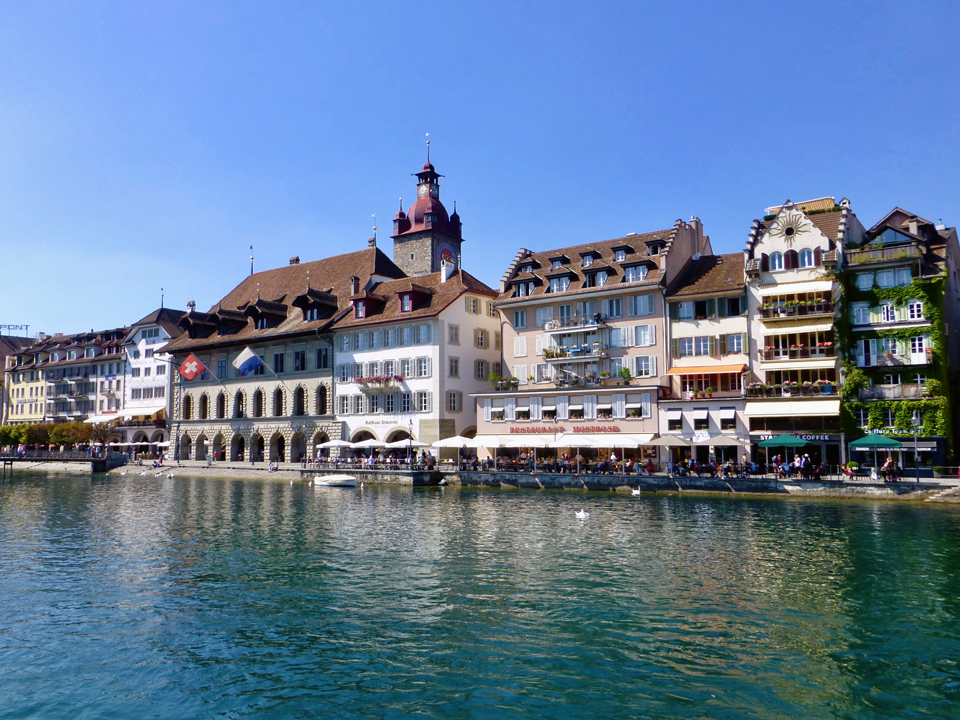
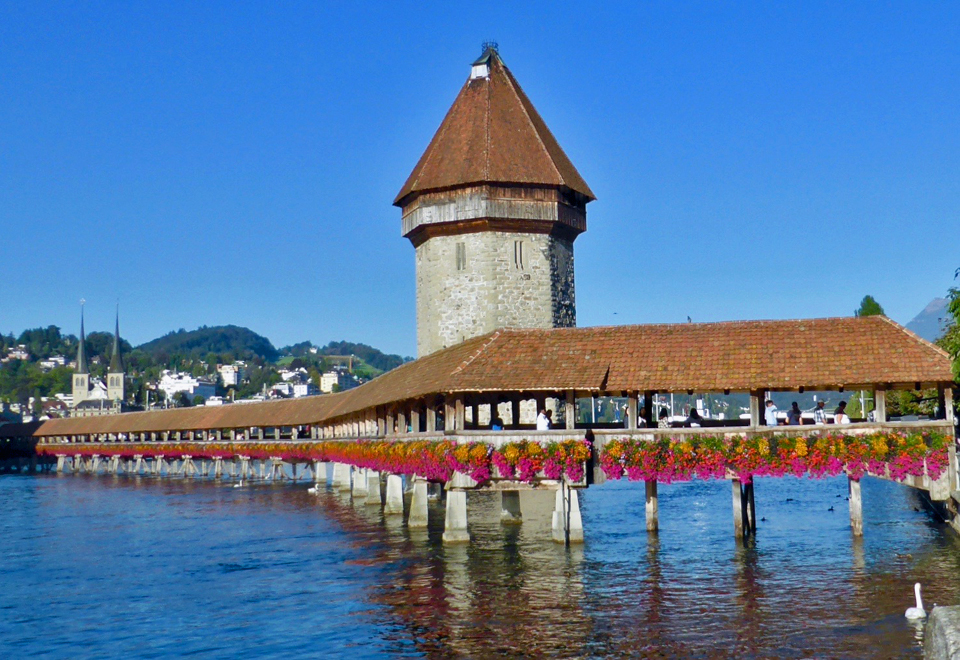
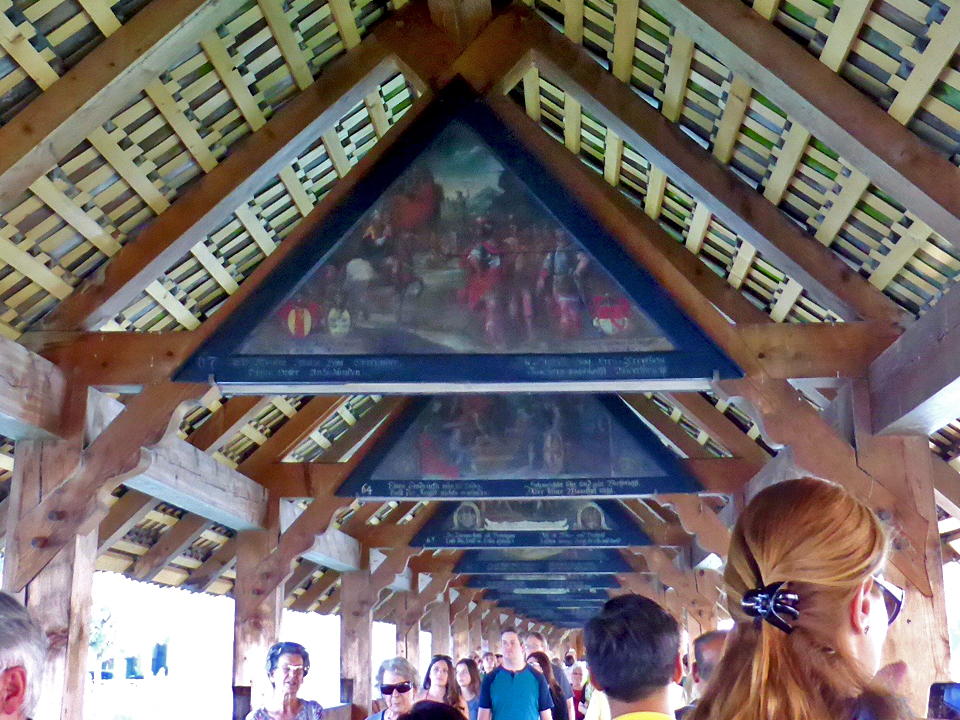
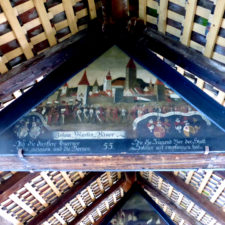
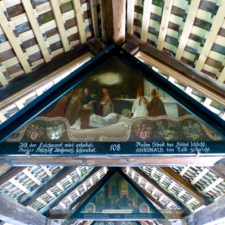
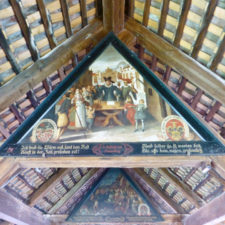
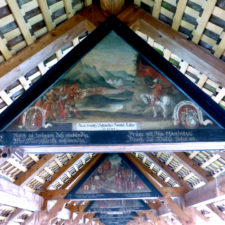
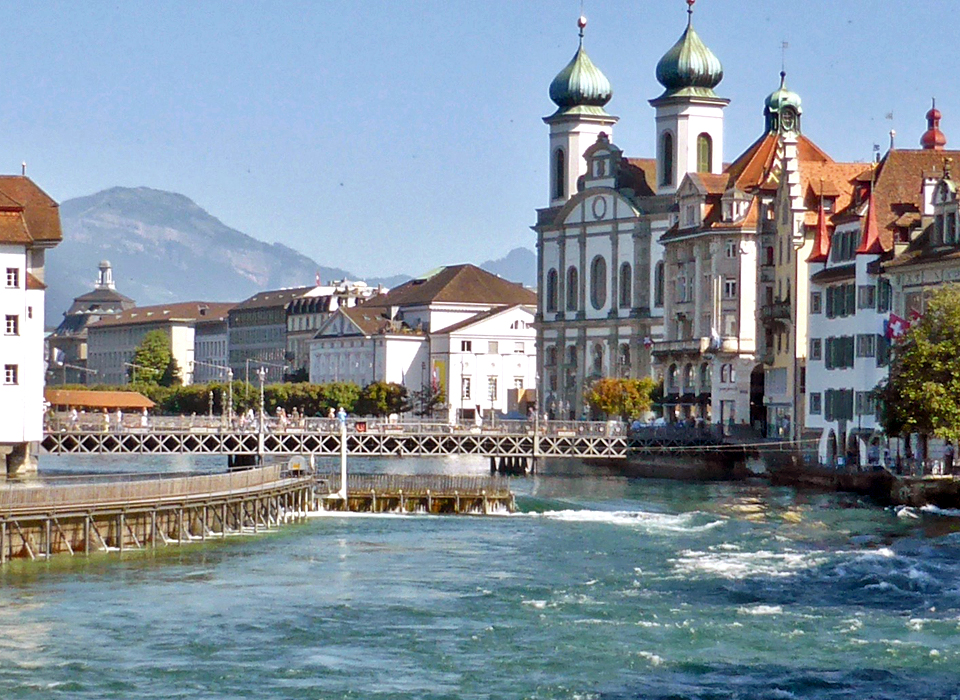
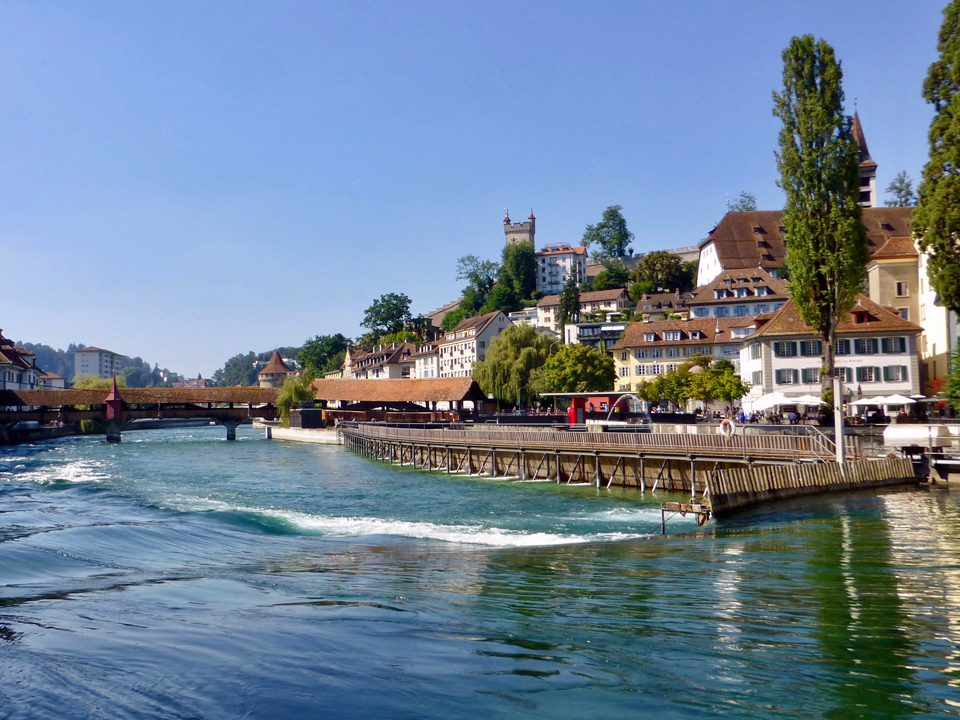
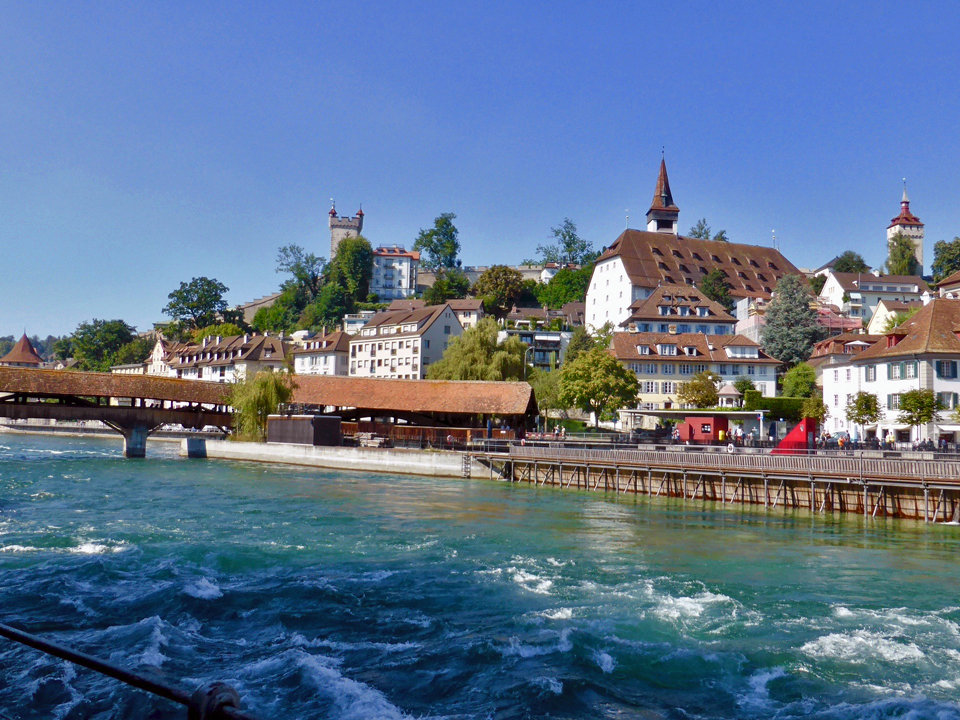

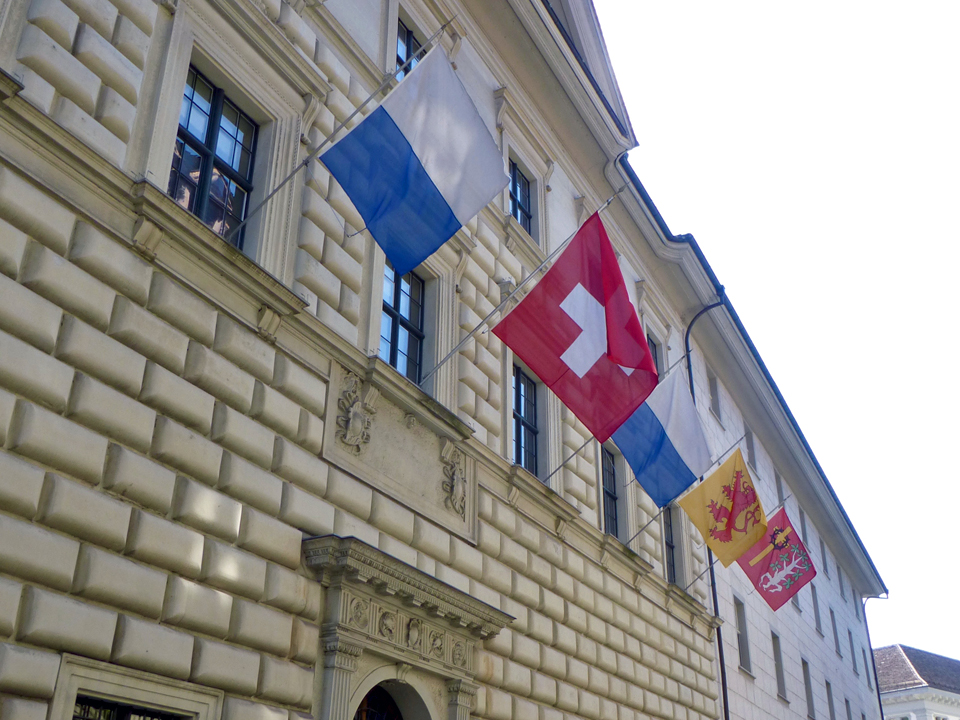
I, too, visited Lucerne recently and loved it. The flowers on the Chapel Bridge are simply breath-taking. I had a lovely day tour of Lucerne, but didn’t stay overnight as I was on the chocolate trail that took me across the lake to Weggis. Which is equally charming! I truly love Switzerland in so many ways.
Yes, so much to love about Switzerland and Lucerne is one of my favorite cities. A trail of Swiss chocolate sounds divine!